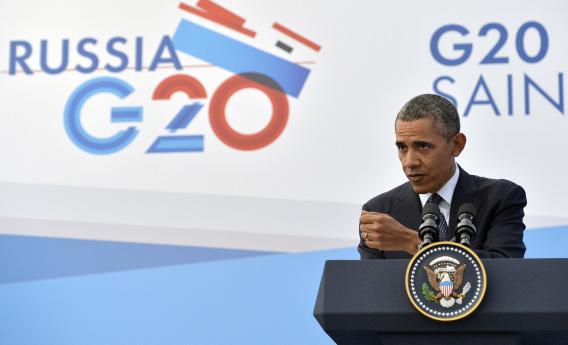In the debate over intervention in Syria, the Obama administration has taken the position that upholding the international norm against the use of chemical weapons trumps the international norm of seeking international approval for the use of military force.
Here’s what the president had to say on the subject today in St. Petersburg:
There are others, and I put myself in this camp, as somebody who is a strong supporter of the United Nations, who very much appreciates the courage of the investigators who have gone in and looks forward to seeing the U.N. report because I think we should try to get more information, not less, in this situation. It is my view, and a view that was shared by a number of people in the room, that given Security Council paralysis on this issue, if we are serious about upholding a ban on chemical weapons use, then an international response is required and that will not come through Security Council action.
And that’s where I think the division comes from. And I respect those who are concerned about setting precedents of action outside of a U.N. Security Council resolution. I would greatly prefer working through multilateral channels and through the United Nations to get this done. But ultimately what I believe in even more deeply, because I think that the security of the world and my particular task looking out for the national security of the United States requires that when there’s a breach this brazen of a norm this important and the international community is paralyzed and frozen and doesn’t act, then that norm begins to unravel.
This sounded a similar note to John Kerry’s speech last week, in which the secretary of state also emphasized that “we in the United States, we believe in the United Nations” but noted regretfully that “because of the guaranteed Russian obstructionism of any action through the U.N. Security Council, the U.N. cannot galvanize the world to act as it should.”
I’ve been wary of facile comparisons between the Syria debate and the run-up to the Iraq War: The situation on the ground and the international context couldn’t be more different. But it is hard not to think back to George W. Bush’s vow in 2003 that “free nations will not allow the United Nations to fade into history as an ineffective, irrelevant debating society,” or his argument to the Security Council following Saddam Hussein’s ouster that a “coalition of nations acted to defend the peace, and the credibility of the United Nations.”
Presidents tend not to argue in the abstract that it should be the responsibility of the United States to enforce international law when the international community can’t get its act together to do so, but sooner or later they often seem to find themselves making that argument.
